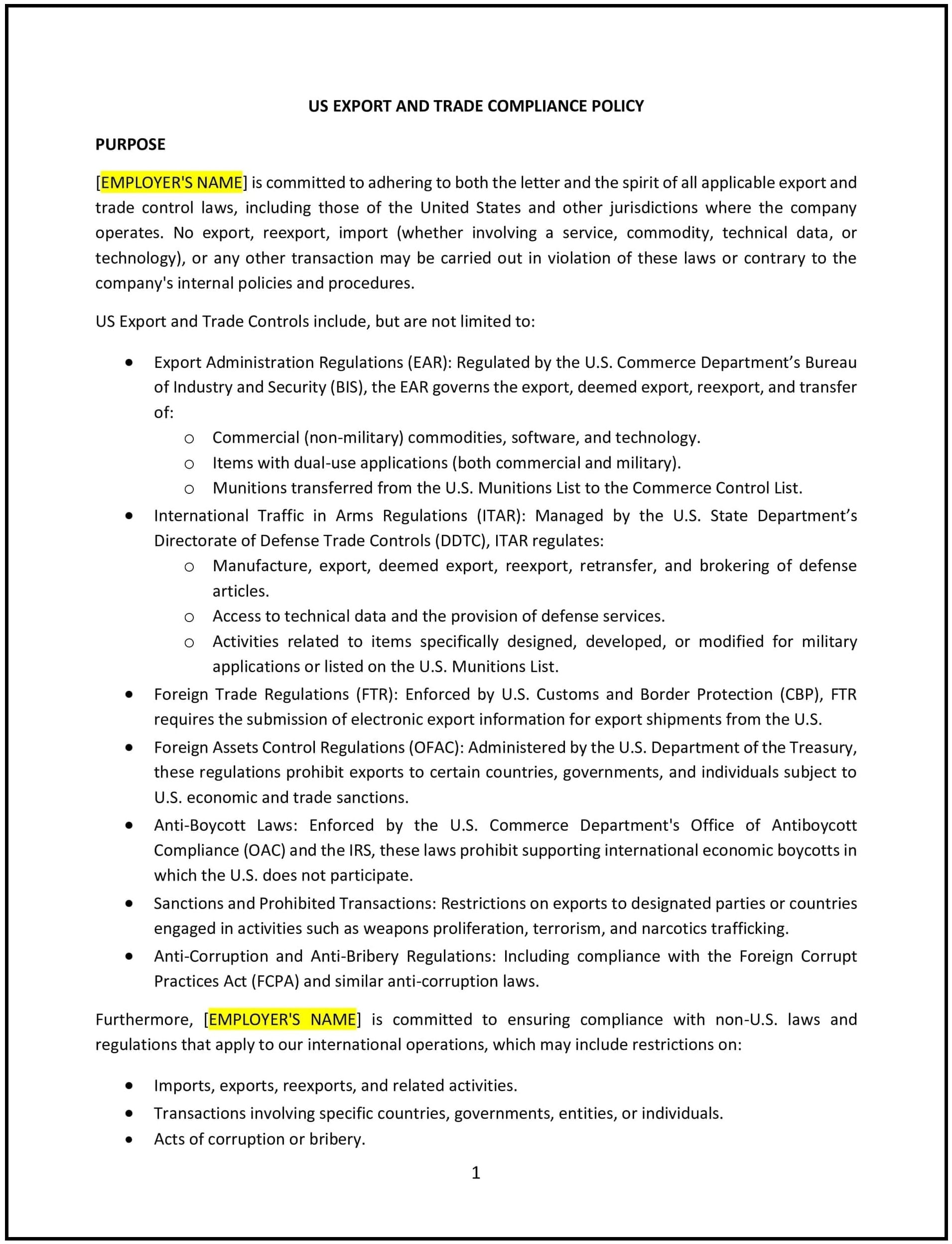US export and trade compliance policy (Washington): Free template
Got contracts to review? While you're here for policies, let Cobrief make contract review effortless—start your free review now.

Customize this template for free
This US export and trade compliance policy is designed to help Washington businesses comply with federal laws and regulations governing the export of goods, services, and technology from the United States. The policy outlines the procedures for ensuring that the company and its employees adhere to the relevant export control laws, including the Export Administration Regulations (EAR) and the International Traffic in Arms Regulations (ITAR). It also provides guidelines on how to manage trade restrictions, embargoes, and sanctions imposed by the U.S. government.
By adopting this policy, businesses can reduce the risk of violations, achieve compliance with U.S. export laws, and protect the company from legal, financial, and reputational risks.
How to use this US export and trade compliance policy (Washington)
- Define export control laws and regulations: The policy should explain the key U.S. export control laws, including the Export Administration Regulations (EAR), International Traffic in Arms Regulations (ITAR), and other relevant federal and state regulations. It should clarify the scope of compliance, including goods, services, and technology covered under these laws.
- Establish procedures for determining export classifications: The policy should specify how employees should classify products and services for export purposes, including determining whether items require an export license or if they are subject to restrictions. It should outline the steps for obtaining an export license, if necessary.
- Address prohibited destinations and parties: The policy should provide clear guidelines on prohibited destinations, entities, and individuals based on U.S. government restrictions. This includes embargoed or sanctioned countries, as well as individuals and organizations listed on restricted parties lists (such as the U.S. Department of Commerce’s Entity List or the Specially Designated Nationals List).
- Outline compliance with trade sanctions: The policy should establish the procedures for ensuring compliance with trade sanctions, including prohibitions against transactions involving certain countries, entities, or individuals. It should also address the company’s obligations when dealing with dual-use items or restricted technologies.
- Set internal controls for export activities: The policy should outline the company’s internal controls for export activities, including recordkeeping, screening, due diligence, and reporting requirements. It should also specify the role of key personnel, such as export compliance officers, in ensuring adherence to the policy.
- Provide training and awareness programs: The policy should require regular training and awareness programs for employees involved in export activities to ensure they are informed of the legal requirements and company procedures. This training should include identifying and mitigating potential compliance risks.
- Ensure compliance with Washington and federal laws: The policy should ensure compliance with relevant state and federal laws, including U.S. Department of Commerce, State Department, and Treasury Department regulations. It should also outline how the company will monitor changes in trade regulations and adapt to new compliance requirements.
- Review and update regularly: Periodically review and update the policy to ensure it remains compliant with Washington state laws, federal regulations, and any changes in company operations. Regular updates will help ensure the policy stays relevant and effective.
Benefits of using this US export and trade compliance policy (Washington)
This policy offers several benefits for Washington businesses:
- Reduces legal and financial risks: By promoting compliance with U.S. export control laws, the policy helps businesses avoid costly fines, penalties, and legal risks related to violations of export regulations.
- Protects the company’s reputation: A robust export compliance program promotes ethical business practices and helps safeguard the company’s reputation by demonstrating a commitment to legal and regulatory obligations.
- Ensures business continuity: By adhering to export regulations, businesses can prevent disruptions in their operations due to non-compliance, including delays in shipments, revoked licenses, or barred transactions.
- Increases employee awareness: The policy fosters a culture of compliance by educating employees about export control laws and their responsibilities, reducing the risk of inadvertent violations.
- Supports international business expansion: Compliance with export control laws enables businesses to expand their international operations without encountering legal or regulatory obstacles that could impact their ability to conduct cross-border trade.
- Enhances internal controls and recordkeeping: The policy helps businesses establish strong internal controls, recordkeeping practices, and screening procedures to manage export activities effectively and reduce the risk of non-compliance.
Tips for using this US export and trade compliance policy (Washington)
- Communicate the policy clearly: Ensure all employees involved in export activities are aware of the US export and trade compliance policy and understand their responsibilities. Include the policy in the employee handbook, review it during onboarding, and provide periodic training to reinforce its importance.
- Establish a clear process for export compliance: Ensure employees understand the steps for determining export classifications, obtaining licenses, and screening transactions. Clearly define the roles and responsibilities of key personnel involved in export compliance.
- Implement regular audits and reviews: Conduct periodic audits to ensure that export activities are compliant with the policy and that all required documentation is properly maintained. This helps identify potential compliance gaps and ensure corrective actions are taken.
- Provide training and education: Offer regular training sessions to employees involved in export activities to ensure they understand the latest regulations, compliance risks, and best practices. Ensure training is updated regularly to reflect changes in laws and regulations.
- Maintain clear records: Ensure that proper documentation is maintained for all export transactions, including licenses, shipment records, and compliance reports. This helps protect the business in case of audits or regulatory inspections.
- Review and update regularly: Periodically review the policy to ensure it remains compliant with Washington state laws, federal regulations, and any changes in the company’s operations. Regular updates will help keep the policy relevant and effective.